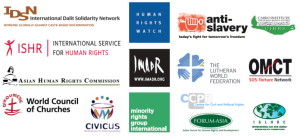IDSN and fourteen other international and regional NGOs have sent a joint open letter to US Secretary of State, Mr. John Kerry, urging the US to take leadership in supporting IDSN’s application for UN consultative (ECOSOC) status. The application has been unjustly deferred for over 7 years.
OPEN LETTER
Mr. John F. Kerry
Secretary of State of the United States of America
U.S. Department of State
2201 C Street NW
Washington DC 20520
23 March 2015
Dear Mr. Secretary,
We, the undersigned group of civil society organizations, are writing to urge the United States, as a member of the ECOSOC Committee on NGOs, to support the nongovernmental organization (NGO) International Dalit Solidarity Network (IDSN) in obtaining special consultative status with the United Nations (UN) and thus freely exercise its right to freedom of expression of its views regarding the elimination of caste-based discrimination.
Civil society is a significant source of expertise and knowledge for the UN human rights system, and plays a critical role in promoting human rights, accountability, the rule of law and development. Despite this crucial contribution, NGOs face countless challenges to their participation in UN processes, including access to bodies such as the Human Rights Council. One of the primary barriers to entry is the difficulty that human rights NGOs experience obtaining ECOSOC consultative status. This is because the Committee on NGOs, which is tasked with considering the applications of NGOs for consultative status, too often deviates from the guiding principles in ECOSOC resolution 1996/31 in its handling of applications for consultative status of credible and deserving human rights NGOs. As a result of its continuous deferrals of applications, the Committee is failing to fulfil its core mandate of giving a voice to these NGOs in particular those working on women’s rights, sexual orientation and gender identity, caste-based discrimination and human rights violations in specific country situations.
As a member of the Committee on NGOs, the United States has frequently shown its commitment to uphold the rights to freedom of association and expression for all at the UN, including by requesting that the Committee take decisions on applications of NGOs repeatedly blocked by States, and that ECOSOC overturn the Committee’s negative recommendations. We now urge the United States to do the same for IDSN, an NGO which has been blocked by the Committee for seven years through ongoing questioning and deferral (65 questions, all from India, as of the time of writing). No credible reason has been given for blocking IDSN, now the longest pending application with the Committee.
In his report to the UN General Assembly in 2014, the UN Special Rapporteur on the exercise of the rights to freedom of peaceful assembly and of association, criticised India for arbitrarily blocking IDSN from obtaining UN consultative status calling it “clearly unacceptable, wrong and unfair”. The Special Rapporteur also highlighted the obligations of multilateral organisations and member States to promote and protect the rights of everyone to access and communication with international human rights mechanisms. He called on all States to uphold the legal obligation to strengthen civil society participation.
As you know, under ECOSOC resolution 1996/31, the Committee on NGOs is mandated to grant consultative status to those organizations whose aims and purposes are in “conformity with the spirit, purposes and principles of the Charter of the United Nations,” and which “undertake to support the work of the United Nations and to promote knowledge of its principles and activities.” We consider that the IDSN fully meets these criteria.
Based in Denmark and operating internationally, IDSN is a reputable and prominent NGO that works globally for the elimination of caste-based discrimination, a significant human rights problem of high relevance to the UN. Representing a network of international human rights groups, development agencies, national Dalit solidarity networks from Europe, and national platforms and NGOs in caste-affected countries, the IDSN carries out its work to promote and protect the human rights of the Dalit peoples through peaceful and lawful means wholly consistent with international law.
As the State Department’s own reporting demonstrates, human rights violations based on caste discrimination take place in several countries around the world. Although the law may protect Dalits, they often face serious obstacles to access to justice, discrimination in education and access to services and caste-based violence, including rape of Dalit women. The US government’s recognition of these human rights abuses should also be reflected by supporting the persons subject to them to participate in the UN. Indeed as long as caste-discrimination occurs, it is vital that NGOs working on their behalf are given a place and voice at the UN.
The IDSN has a right to receive a response to their request for consultative status in a reasonable timeframe. After seven years in the Committee, it is time for the Committee on NGOs and/or ECOSOC to take action on the application, and we strongly urge the United States to take a leadership role to ensure this happens.
Sincerely,
International Dalit Solidarity Network (IDSN)
International Service for Human Rights (ISHR)
Human Rights Watch (HRW)
Anti-Slavery International (ASI)
Asian Human Rights Commission (AHRC)
Asian Forum for Human Rights and Development (FORUM-ASIA)
International Movement Against all forms of Discrimination and Racism (IMADR)
Minority Rights Group International (MRG)
Lutheran World Federation (LWF)
World Council of Churches (WCC)
World Organisation Against Torture (OMCT)
International Gay and Lesbian Human Rights Commission (IGLHRC)
International Center for Civil and Political Rights (CCPR)
Cairo Institute for Human Rights Studies (CIHRS)
CIVICUS- World Alliance for Citizen Participation
Related information:
Download the open letter as a PDF
Read more about the IDSN application for UN consultative (ECOSOC) status
Resolution condemning caste-based discrimination introduced in the US congress (IDSN News)

